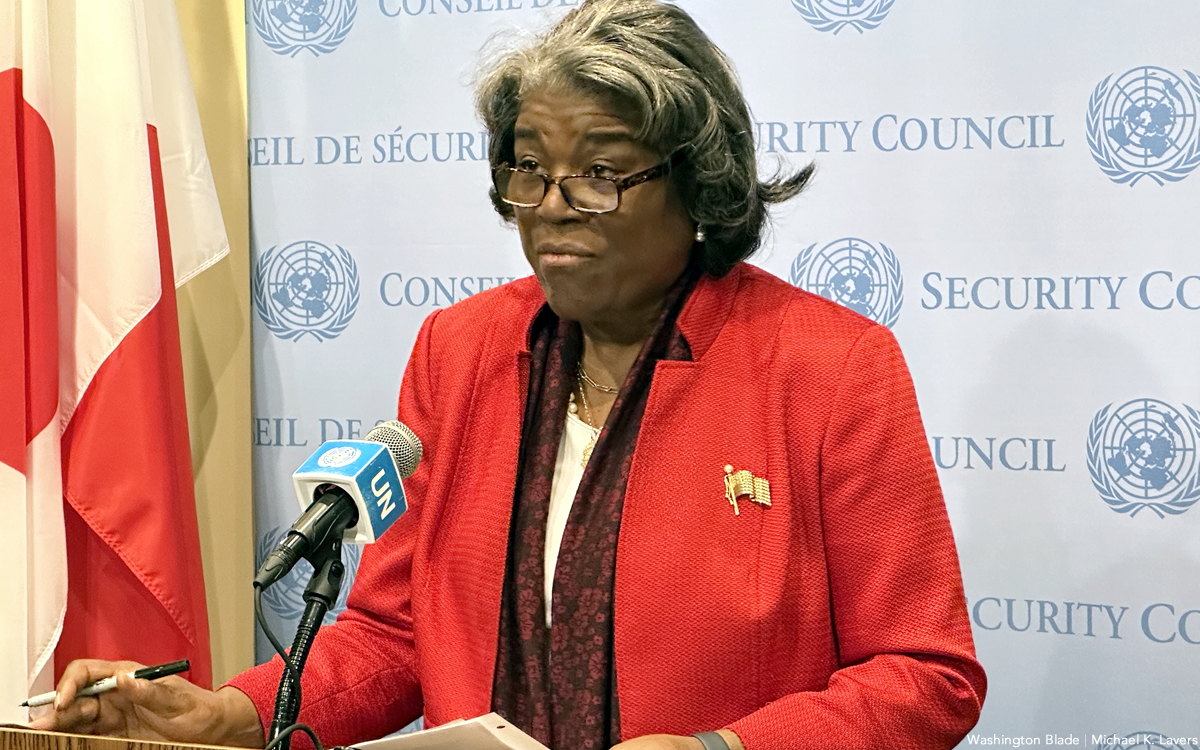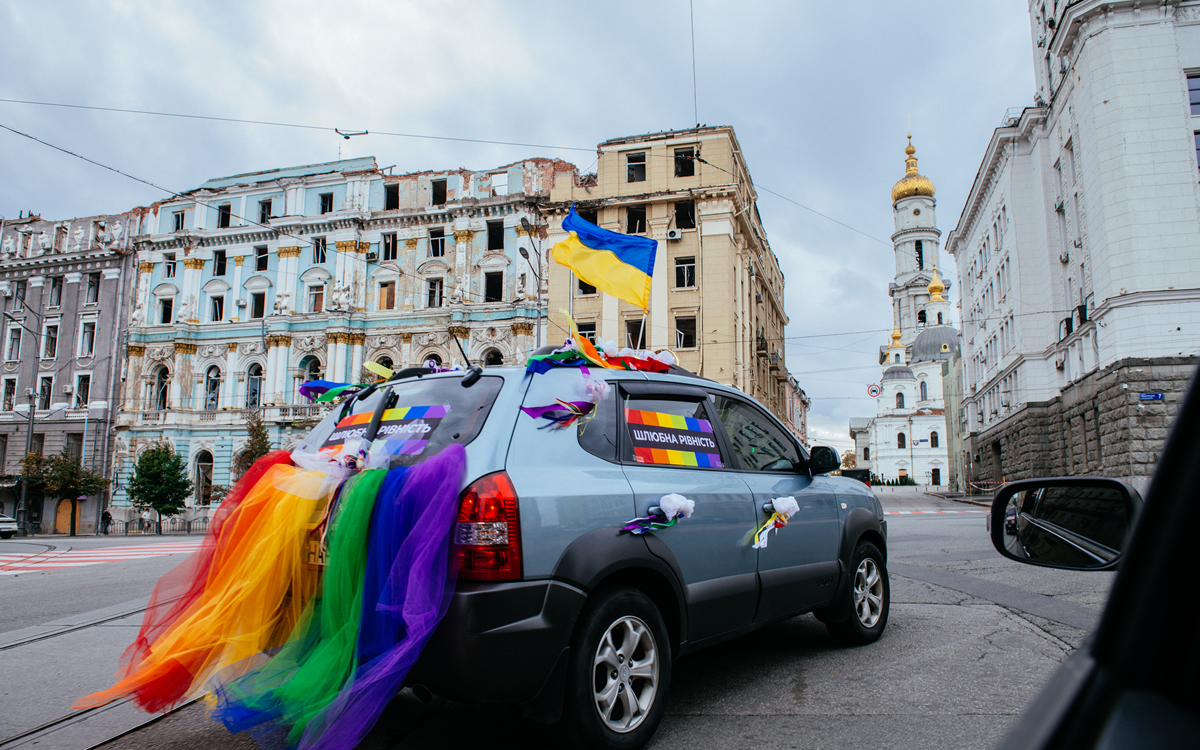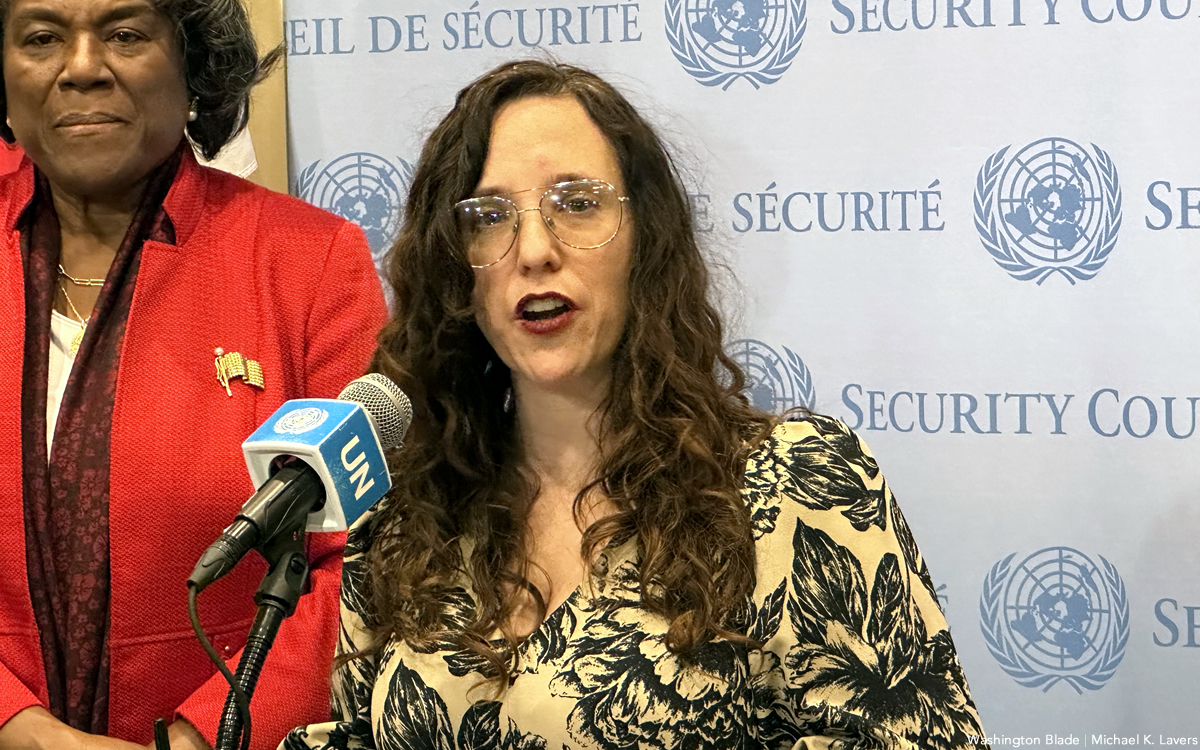United Nations
UN Security Council urged to focus on LGBTQ, intersex rights
U.S. Ambassador to the U.N. Linda Thomas-Greenfield chaired Monday meeting

UNITED NATIONS — U.S. Ambassador to the U.N. Linda Thomas-Greenfield on Monday chaired a meeting at the United Nations that focused on the integration of LGBTQ and intersex rights into the U.N. Security Council’s work.
The U.S. Mission to the U.N. co-sponsored the meeting along with Albania, Brazil, Cyprus, the Czech Republic, France, Greece, Japan, Malta, Switzerland, the U.K. and the LGBTI Core Group, a group of U.N. countries that have pledged to support LGBTQ and intersex rights.
Thomas-Greenfield announced four “specific steps the U.S. will take to better integrate LGBTQI+ concerns into the U.N. Security Council’s daily work.”
• A regular review of the situation of LGBTQ and intersex people in conflict zones on the Security Council’s agenda that “includes regularly soliciting information from LGBTQI+ human rights defenders.
• Encouraging the U.N. Secretariat and other U.N. officials to “integrate LGBTQI+ concerns and perspectives in their regular reports” to the Security Council.
• A commitment “to raising abuses and violations of the human rights of LGBTQI+ people in our national statements in the Security Council.”
• A promise to propose, “when appropriate, language in Security Council products responding to the situation of LGBTQI+ individuals.”
“We are proud of these commitments,” said Thomas-Greenfield during Monday’s meeting. “They are just the beginning.”

Victor Madrigal-Borloz, the independent U.N. expert on LGBTQ and intersex issues, provided a briefing on LGBTQ and intersex rights around the world.
“My mandate is based on one single fact: Diversity and sexual orientation and gender identity is a universal feature of humanity,” he said. “For too long, it has been made invisible in national level contributions to peace and security, including policies and programs and in the political and programmatic action of the United Nations.”
María Susana Peralta of Colombia Diversa — an LGBTQ and intersex advocacy group in Colombia that participated in talks between the country’s government and the Revolutionary Armed Forces of Colombia that led to an LGBTQ-inclusive peace agreement then-President Juan Manuel Santos and then-FARC Commander Rodrigo “Timochenko” Londoño signed in 2016 — and Afghan LGBT Organization Director Artemis Akbary also took part in the meeting.
Peralta said Colombia’s peace agreement “has created a standard by which other countries can use,” but noted the country’s Special Justice for Peace has yet to prosecute anyone who committed human rights abuses based on sexual orientation or gender identity during the war.
Akbary noted the persecution of LGBTQ and intersex people in Afghanistan has increased since the Taliban regained control of the country in 2021. Akbary also said LGBTQ and intersex Afghans cannot flee to Iran and other neighboring countries because of criminalization laws.
“The whole world is watching as the rights of LGBTQ people are systematically violated in Afghanistan,” said Akbary. “LGBTQ people on the ground in Afghanistan need and deserve protection.”
Representatives of U.N. delegations from France, Brazil, Albania, Japan, Ecuador, Switzerland, the U.K., Malta, Colombia, South Africa, Ireland, Germany, the Netherlands and the European Union spoke in favor of the integration of LGBTQ and intersex rights into the Security Council’s work.
“A person’s actual or perceived sexual orientation, gender identity or gender expression or sex characteristics often increases the risk of of becoming the target in conflict and crisis situations,” said Luis Guilherme Parga Cintra of Brazil.
British Ambassador to the U.N. General Assembly Richard Crocker made a similar point.
“We know the conflicts have disproportionate impact on marginalized communities: Women and girls, persons with disabilities, members of ethnic and religious minority groups,” he said. “It is only right the Security Council is discussing this issue today.”
Ambassador Karlito Nunes, who is Timor-Leste’s permanent U.N. representative, read a statement in support of the Security Council discussions about LGBTQ and intersex issues. Representatives from China, Russia and Ghana who spoke said the Security Council is not the appropriate place to discuss them.
“Sexual orientation is an individual choice of every individual,” said the Russian representative.
The meeting took place less than 13 months after Russia launched its war against Ukraine.
A Russian airstrike on March 1, 2022, killed Elvira Schemur, a 21-year-old law school student who volunteered for Kharkiv Pride and Kyiv Pride, while she was volunteering inside the Ukrainian city of Kharkiv’s regional administration building. Activists with whom the Washington Blade has spoken said LGBTQ and intersex people who lived in Russia-controlled areas of the country did not go outside and tried to hide their sexual orientation or gender identity because they were afraid of Russian soldiers.

The Security Council’s first-ever LGBTQ-specific meeting, which focused on the Islamic State’s persecution of LGBTQ Syrians and Iraqis, took place in 2015. Then-U.S. Ambassador to the U.N. Samantha Power, who is now director of the U.S. Agency for International Development, and then-International Gay and Lesbian Human Rights Commission Executive Director Jessica Stern, who is now the special U.S. envoy for the promotion of LGBTQ and intersex rights, are among those who participated.
Stern, along with U.S. Reps. David Cicilline (D-R.I.) and Ritchie Torres (D-N.Y.), attended the meeting alongside OutRight International Executive Director Maria Sjödin, among others.

The Security Council in June 2016 formally condemned the Pulse nightclub in Orlando, Fla. The U.N. Human Rights Council a few months later appointed Vitit Muntarbhorn as the first independent U.N. expert on LGBTQ and intersex issues. (Madrigal-Borloz succeeded Muntarbhorn in 2018.)
Then-U.S. Ambassador to the U.N. Kelly Knight Craft and then-U.S. Ambassador to Germany Richard Grenell in 2019 during a U.N. General Assembly meeting hosted an event that focused on efforts to decriminalize consensual same-sex sexual relations around the world.
President Joe Biden in 2021 signed a memo that committed the U.S. to promoting LGBTQ and intersex rights abroad as part of the Biden-Harris administration’s overall foreign policy. Then-State Department spokesperson Ned Price later told the Washington Blade the decriminalization of consensual same-sex sexual relations is one of the White House’s five priorities as it relates to the promotion of LGBTQ and intersex rights overseas.
The U.S., the U.K., France, China and Russia are the Security Council’s five permanent members. Albania, Brazil, Ecuador, Gabon, Ghana, Japan, Malta, Mozambique, Switzerland and the United Arab Emirates are the 10 non-permanent members.
Ghana and the United Arab Emirates are two of the dozens of countries in which consensual same-sex sexual relations remain criminalized.
“Today’s meeting was an important first step toward further concrete actions the Security Council, and all parts of the U.N., can take to integrate LGBTQI+ human rights, experiences, and perspectives into their day-to-day work,” Thomas-Greenfield told the Blade in a statement after Monday’s meeting. “We’re proud of the four commitments we made today, and we will keep working to make sure this topic remains on the Council’s agenda.”
Congress
Mike Waltz confirmed as next UN ambassador
Trump nominated former national security advisor in May

The U.S. Senate on Sept. 19 confirmed former U.S. Rep. Mike Waltz (R-Fla.) as the next U.S. ambassador to the U.N.
The Florida Republican had been the national security advisor until President Donald Trump in May tapped him after U.S. Rep. Elise Stefanik (R-N.Y.) withdrew her nomination in order to ensure Republicans maintained their narrow majority in the U.S. House of Representatives.
Senators approved Waltz’s nomination by a 47-43 vote margin.
“Thank you President Trump and the U.S. Senate for your trust and confidence to Make the UN Great Again,” said Waltz on X.
The U.N. General Assembly is taking place this week in New York. Trump is scheduled to speak on Tuesday.
United Nations
UN Human Rights Council extends LGBTQ rights expert’s mandate
29 countries voted for resolution

The U.N. Human Rights Council on Monday extended the mandate of the United Nations’ independent LGBTQ rights expert for another three years.
The resolution passed with 29 countries (Albania, Belgium, Bolivia, Brazil, Bulgaria, Chile, Colombia, Costa Rica, Cuba, Cyprus, the Czech Republic, the Dominican Republic, France, Georgia, Germany, Iceland, Japan, Kenya, the Marshall Islands, Mexico, the Netherlands, North Macedonia, South Korea, Romania, South Africa, Spain, Switzerland, Thailand, and Vietnam) voting for it and 15 countries (Algeria, Bangladesh, Burundi, China, Cote d’Ivoire, Democratic Republic of Congo, Ethiopia, Gambia, Indonesia, Kuwait, Malawi, Maldives, Morocco, Qatar, and Sudan) voted against it.
Benin, Ghana, and Kyrgyzstan abstained.
The U.S. in February withdrew from the Human Rights Council. The Trump-Pence administration in 2018 pulled the U.S. from it. The U.S. in 2021 regained a seat on the Human Rights Council.
Graeme Reid has been the UN’s independent LGBTQ rights expert since 2023. The South African activist, among other things, previously ran Human Rights Watch’s LGBT Rights Program.
United Nations
Trump pulls Elise Stefanik’s UN ambassador nomination
Republicans have slim majority in US House of Representatives

President Donald Trump on Thursday withdrew U.S. Rep. Elise Stefanik (R-N.Y.)’s nomination to become the next U.S. ambassador to the U.N.
The Associated Press noted Trump in a Truth Social post said it was “essential to maintain every Republican seat in Congress.”
Republicans currently have a narrow 218-213 majority in the U.S. House of Representatives. Special elections to fill the seats that National Security Adviser Mike Waltz and former U.S. Rep. Matt Gaetz (R-Fla.) vacated when they joined the Trump-Vance administration and resigned respectively will take place on April 1 in Florida.
“Elise Stefanik is truly a great leader and a devoted patriot,” said House Speaker Mike Johnson (R-La.) in a statement. “Today’s selfless decision shows America what those of us who work with her already know. She is deeply devoted to her country and fully committed to see President Trump’s agenda succeed in Congress.”
“It is well known Republicans have a razor-thin House majority, and Elise’s agreement to withdraw her nomination will allow us to keep one of the toughest, most resolute members of our conference in place to help drive forward President Trump’s America First policies,” he added. “There is no doubt she would have served with distinction as our ambassador to the United Nations, but we are grateful for her willingness to sacrifice that position and remain in Congress to help us save the country.”
Stefanik, 40, has represented New York’s 21st Congressional District since 2015. She later became chair of the House Republican Conference.
Stefanik in 2019 voted for the Equality Act, but she opposed it in 2021. Stefanik in 2022 is among the dozens of Republicans who voted for the Respect for Marriage Act that then-President Joe Biden signed.
Stefanik, among other things, has also been outspoken against antisemitism on college campuses.
Trump has not said who he will nominate to become U.N. ambassador. Johnson in his statement said he will “invite her to return to the leadership table” of the House Republican Conference “immediately.”

















